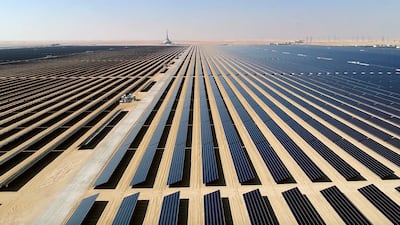Global leaders and corporations should not view the environment and economy as two separate issues and should continue to push for decarbonisation, which has both economic and social consequences.
What the world has experienced this summer is a call for action and a “taste of what's to come”, with floods in Pakistan displacing millions and fires breaking out on the outskirts of London amid a rise in global temperatures, Sheikha Shamma bint Sultan, founder and chief executive of Alliances for Global Sustainability, said on Wednesday.
“We should never look at the environment and the economy as mutually exclusive, and this is also the reason why we must adapt and focus on decarbonisation and hone in on the economic and social impacts,” she told a panel discussion on climate adaptation at a Harvard Business School conference in Dubai.
Decarbonisation, building back better and developing a greener and more sustainable global economy have become a focal point for policymakers as the world emerges from the Covid-19 pandemic.
Governments around the globe have committed to cut their carbon footprint and have set ambitious targets to meet global climate action goals.
The UAE's Net Zero 2050 Strategic Initiative calls for Dh600 billion ($163.37bn) to be invested in clean and renewable energy sources in the next three decades.
The Arab world’s second-largest economy is also hosting the Cop28 climate conference in 2023 at Expo City Dubai. The summit will focus on finding solutions to the threats posed by climate change.
“When we think of the planet, we need to think of our impact — not within our borders because the planet has no borders, and so what we do in the UAE or in the region affects other nations as one,” Sheikha Shamma said.
“I do believe that a global effort is needed to address climate action, especially when it comes to low-income populations, developing nations and small island states.
“It is everyone's responsibility to take climate action seriously and to do our part, as individuals, as companies [and] as communities.”
Paddy Padmanathan, chief executive of Saudi Arabia's Acwa Power, said climate change and rising temperatures in Gulf waters were already affecting its water and power generations assets.
The company plans to invest in “adaptive machinery” to tackle future challenges, he said.
Climate-related problems are not limited to this part of the world and the “double whammy” is evident in Europe where the Rhine is flowing at a lower level and power plants that need its water to cool down cannot do so as their intakes were built for a much higher water level, Mr Padmanathan said.
“Adjusting the level would require shutting down these plants for months, which is a huge problem given Europe’s energy crisis,” he said.
“Everybody is going to be impacted by these things. It is not just us … I think we're all in the same boat, and we all have to find the solutions.
“So, we are very consciously now looking at implementing adaptive machines … I will be actually investing in that division.”
With the advances in technology, artificial intelligence, machine learning and the enhanced ability to absorb data, the industry is able to find solutions at a “much more cost competitive rate” and much faster than in the past, he said.











